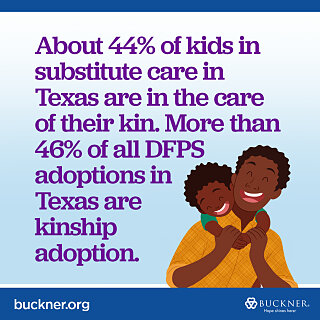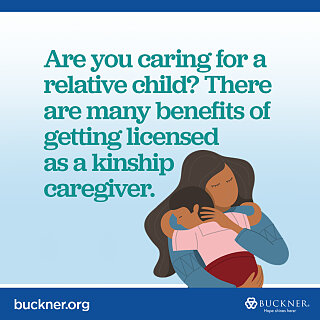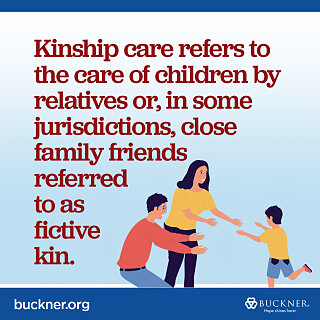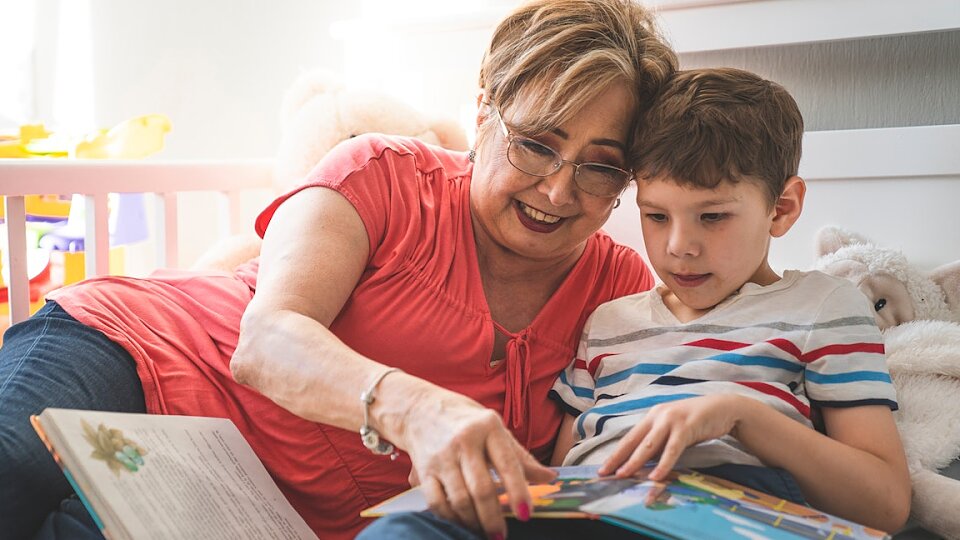For children experiencing tumultuous life changes, a familiar face can go a long way. When kids are removed from their home due to abuse or neglect, the Texas Department of Family and Protective Services often look for a family member or friend that can take custody of the child temporarily. These relatives offer what is called kinship care.
Kinship caregivers can get licensed which provides more training and assistance to the family. Buckner supports families caring for kinship children in foster care with support and resources. In Texas, about 44% of kids in substitute care are in the care of their kin.
 Kinship homes offer stability, belonging and confidence for children
Kinship homes offer stability, belonging and confidence for children
There are many benefits for a child to be placed in a kinship home.
“The children already have an emotional tie or connection to that person and usually a trusting relationship,” Taylor Zreet, kinship care specialist for Buckner Children and Family Services, explained. “Even if it’s not a blood relative, it’s someone who knows them and/or knows their biological family. This gives them an anchor as they navigate the new changes in their life.”
Entering into foster care presents many new experiences for children. From meeting case workers, sometimes a new school or daycare, living with new people in a new house, it’s a lot of change quickly. But when a child is placed into kinship care rather than a traditional foster home, there is typically less trauma as well as opportunities for them to stay within their geographical community, culture and support system.
When working with Buckner as the agency, kinship families receive case management, therapy, support with doctor’s appointments and formal evaluations of a child’s needs. Jumping into the process to become a licensed kinship caregiver can be overwhelming. While they know they want to care for the child and keep them safe, navigating the paperwork and figuring out benefits can be confusing.
 The average time a child is in an active kinship foster home is between six to 10 months. For kinship families, it’s typically a lot of work in the beginning to become licensed, but well worth it once the case is officially closed. Through licensure, caregivers receive training on trauma, grief and loss, and connection, as well as case management and financial resources to help support them in providing a home for the child.
The average time a child is in an active kinship foster home is between six to 10 months. For kinship families, it’s typically a lot of work in the beginning to become licensed, but well worth it once the case is officially closed. Through licensure, caregivers receive training on trauma, grief and loss, and connection, as well as case management and financial resources to help support them in providing a home for the child.
How communities can support kinship caregivers
For the kinship caregiver, it can be challenging to pick up the role as a parent or main caregiver again.
“Many of them are struggling with having to relive roles they thought they already gave up,” Zreet shared. “For example, a grandparent in their 60s is now parenting their elementary-aged grandchildren. They also often have to cope with a lot of emotional pressure with their relatives as well as with the biological parents. It can be very mentally taxing to set clear boundaries.”
Setting boundaries with loved ones in the placement process can be challenging. As a grandparent caring for a grandchild, imagine having to place boundaries for your own child for when they can see their child.
For those in community with kinship families, support and assistance can be invaluable. From offering to become certified babysitters by completing a background check to bringing by a meal every few weeks, neighbors, friends and loved ones can support the entire family walking through the kinship journey.
“Bringing diapers or formula by if needed or even offering to help with driving kids to and from sports practices are all ways to help and support these caregivers,” Zreet said. “Even offering to run errands one day can be something incredibly helpful during this chaotic time.”
The evolution of kinship care: Yesterday, today and tomorrow
It’s always been common for grandparents to shift into the role of the primary caregiver when parents are unable to care for their children. In 1978, kinship care was officially added to the child welfare system across the U.S. But it wasn’t until the 1990s that kinship care was considered a program within foster care.
 Each state determines assistance provided to kinship caregivers. And by working with an agency like Buckner, assistance and support can multiply.
Each state determines assistance provided to kinship caregivers. And by working with an agency like Buckner, assistance and support can multiply.
“Agencies, like Buckner, offer benefits like a daily reimbursement paid once a month, extra reimbursement for clothing twice a year, assistance with navigating the paperwork and expenses of being licensed,” Zreet explained. “When a kinship family either obtains guardianship or adopts, the agency is able to help with those processes as well. After this, most of our families received a monthly stipend from the state until the child is 18 as well as Medicaid.”
While kinship care has been an official program for nearly 30 years, there are still ways to improve and adapt the way families and children are supported throughout the process.
Texas Alliance of Child and Family Services recently released an updated best practices manual on kinship care for child-placing agencies in Texas. It includes ways to empower agencies to wrap around kinship families to support them through placement, assessments and licensure, and even through permanency.
Andi Harrison, regional director for Buckner foster care and adoption, contributed alongside TACFS and other organizations to refine the manual.
“Through this manual, both providers and policymakers in Texas can gain a better understanding of kinship services – and see why the opportunities for supporting kinship placements are so valuable,” Harrison said.
A large portion of kinship placements result in long-term permanency for children. Buckner is dedicated to finding families for children – and putting the child’s needs first. While reunification with family is a priority, when that isn’t possible, finding a permanent home that offers belonging, love and stability to support the child’s success is always the goal.
September is National Kinship Month. Find out more about the resources available to kinship families through Buckner.




Add a Comment